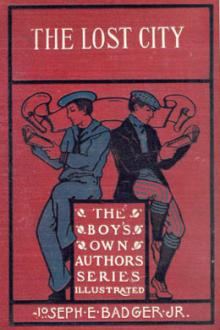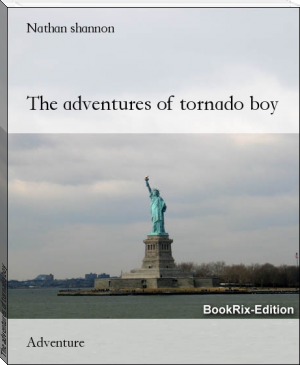The Lost City - Jr. Joseph E. Badger (children's books read aloud txt) 📗

- Author: Jr. Joseph E. Badger
- Performer: -
Book online «The Lost City - Jr. Joseph E. Badger (children's books read aloud txt) 📗». Author Jr. Joseph E. Badger
is the terra incognita of which I have dreamed so long!”
That refuge proved to be a large, fairly dry cavern, the entrance
to which was admirably masked by vines and creepers, while the
stony soil just there retained no trace of footprints to tell
dangerous tales.
Mr. Edgecombe vanished, but not for long. Then, showing a
light, formed of fat and twisted wick in a hollowed bit of
hardwood, he begged his rescuers to enter.
No second invitation was needed, for even the professor felt a
powerful curiosity to learn what method had been followed by this
enforced exile; how he had managed to live for so many weary
years.
With only that smoky lamp to shed light around the place,
critical investigation was a matter of time and painstaking,
although a general idea of the cavern was readily formed.
High overhead arched the rocky roof, blackened by smoke, and
looking more gloomy than nature had intended. The side walls
were likewise irregular, now showing tiny niches and nooks, then
jutting out to form awkward points and elbows, which were but
partially disguised by such articles of wear and daily use as the
exile had collected during the years gone by, or since his
occupancy first began.
So much the professor took in with his initial glances, but then
he left Waldo and his brother to look more closely, himself
giving thought to the being whom they had so happily saved from
the whirlpool.
“Professor Edgecombe!” he again exclaimed, grasping those
roughened hands to press them cordially. “I ought to have
recognised you at sight, no doubt, since I have watched your
ascents time and time again.”
The exile smiled faintly, shaking his head and giving another
sigh.
“Ah, me! ‘twas vastly different, then. I only marvel that you
should give me credit when I lay claim to that name, so long—it
has long faded from the public’s memory, sir.”
But uncle Phaeton shook his head, decidedly.
“No, no, I assure you, my friend; far from it. Whenever the
topic is brought to the front; whenever aerostatics are
discussed, your name and fame are sure to play a prominent part.
And yet,—you disappeared so long ago, never being heard of
after—”
“After sailing away upon the storm for which I had waited and
prayed, for so many weary, heart-sick months!”
“So the rumour ran, but we all believed that must be an
exaggeration, and not for a long time was all hope abandoned.
Then, more hearts than one felt sore and sad at thoughts of your
untimely fate.”
“A fate infinitely worse than ordinary death such as was credited
me,” huskily muttered the exile. “Ten years,—and ever since I
have been here, helpless to extricate myself, doomed to a living
death, which none other can ever fully realise! Doomed to—to—”
His voice choked, and he turned away to hide his emotions.
Professor Featherwit thoroughly appreciated the interruption
which came through Waldo’s lips just at that moment.
“Oh, I say,—uncle Phaeton!”
“What is it, lad? Don’t meddle with what doesn’t—”
“Looking can’t hurt, can it? And to think people ever got along
with such things as these!”
Waldo was squared before sundry articles depending from the side
wall, and as the professor drew closer, he, too, displayed a
degree of interest which was really remarkable.
A gaily colored tunic of thickly quilted cotton was hanging
beside an oddly shaped war club, the heavier end of which was
armed with blades of stone which gleamed and sparkled even in
that dim light. And attached to this weapon was another, hardly
less curious: a knife formed of copper, with heft and blade all
from one piece of metal.
“Here is the rest of the outfit,” said Edgecombe, holding forth a
bow and several feathered arrows with obsidian heads.
Professor Featherwit gave a low, eager cry as he handled the
various articles, both face and manner betraying intense delight,
which found partial vent in words a little later.
“Wonderful! Marvellous! Superb! I envy you, sir; I can’t help
but envy your possession of so magnificent—and so
well-preserved, too! That is the marvel of marvels!”
“Well, to be sure, I haven’t used them very much. The bow and
arrows I could manage fairly well, after busy practice. They
have saved me from more than one hungry night. But as for the
rest—”
“You might have worn the—Is it a ghost-dance shirt, though?”
hesitatingly asked Waldo, gingerly fingering the wadded tunic.
“Waldo, I’m ashamed of you, boy!” almost harshly reproved the
professor. “Ghost-dance shirt, indeed! And this one of the most
complete—the only perfectly preserved specimen of the ancient
Aztec—pray, my good friend, where did you discover them? Surely
there can be no burial mounds so far above the latitude where
that unfortunate race lived and died?”
Mr. Edgecombe shook his head, with a puzzled look, then made
reply:
“No, sir. I took these all from an Indian I was forced to kill
in order to save my own life. I never thought—You are ill,
sir?”
“Bless my soul!” ejaculated the professor, falling back a pace or
two, then sitting down with greater force than grace, all the
while gazing upon those weapons like one in a daze. “Found
them—Indian—killed him in order to—bless my soul!”
Then, with marvellous activity for one of his age, the professor
recovered his footing, mumbling something about tripping a heel,
then resumed his examination of the curiosities as though he had
care for naught beside.
Cooper Edgecombe turned away, and the professor improved the
opportunity by muttering to the brothers:
“Careful, lads. Give the poor fellow his own way in all things,
for he is—he surely must be—eh?”
Forefinger covertly tapped forehead, for there was no time
granted for further explanations. Edgecombe turned again,
speaking in hard, even strained tones:
“Fifteen years ago this month, on the 27th, to be exact, a
balloon with two passengers was carried away on a terrific gale
of wind which blew from the southeast. This happened in
Washington Territory. Can you tell me—has anything ever been
heard of either balloon or its inmates?”
Professor Featherwit shook his head in negation before saying:
“Not to my knowledge, though doubtless the prints of the day—”
Cooper Edgecombe shook both head and hand with strange
impatience.
“No, no. I know they were never heard from up to ten years ago,
but since then—I am a fool to even dream of such a thing, and
yet,—only for that faint hope I would have gone mad long ago!”
Indeed, he looked little less than insane as it was.
CHAPTER XII. THE STORY OF A BROKEN LIFE.
This was the idea that occurred to both uncle and nephews, but
they had seen and heard enough to excuse all that, and Professor
Featherwit spoke again, in mildly curious tones:
“Sorry I am unable to give you better tidings, my good friend,
but, so far as my knowledge extends, nothing has come to light of
recent years. And—if not a leading question—were those
passengers friends of your own?”
“Only—merely my—my wife and little daughter,” came the totally
unexpected reply, followed by a forced laugh which sounded
anything but mirthful.
Uncle Phaeton, intensely chagrined, hastened to apologise for his
luckless break, but Cooper Edgecombe cut him short, asking that
the matter be let drop for the time being.
“I will talk; I feel that I must tell you all, or lose what few
wits I have left,” he declared, huskily. “But not right now. It
is growing late. You must be hungry. I have no very extensive
larder, but with my little will go the gratitude of a man who—”
His voice choked, and he left the sentence unfinished, hurrying
away to prepare such a meal as his limited means would permit.
While Edgecombe was kindling a fire in one corner of the cavern,
opening a pile of ashes to extract the few carefully cherished
coals by means of which the wood was to be fired, uncle and one
nephew left the den to look after the flying-machine and
contents.
Bruno remained behind, in obedience to a hint from the professor,
lest the exile should dread desertion, after all.
“Take these in and open them, Waldo,” said the professor,
selecting several cans from the stock in the locker. “Poor
fellow! ‘Twill be like a foretaste of civilisation, just to see
and smell, much less taste, the fruit.”
“Even if he has turned looney, eh, uncle Phaeton?”
“Careful, boy! I hardly think he is just that far gone; but,
even if so, what marvel? Think of all he must have suffered
during so many long, dreary years! and—his wife and child! I
wonder—I do wonder if he really killed—but that is incredible,
simply and utterly incredible! An Aztec—here—alive!”
“Dead, uncle Phaeton,” corrected Waldo. “Killed the redskin, he
said, and I really reckon he meant it. Why not, pray?”
“But—an Aztec, boy!” exclaimed the bewildered savant, unable to
pass that point. “The tunic of quilted cotton, the escaupil!
The maquahuitl, with its blades of grass! The bow and arrows
which—all, all surely of Aztecan manufacture, yet seemingly
fresh and serviceable as though in use but a month ago! And the
race extinct for centuries!”
“Well, unless he’s a howling liar from ‘way up the crick, he
extincted one of ‘em,” cheerfully commented Waldo, bearing his
canned fruit to the cavern.
Professor Featherwit followed shortly after, finding the exile
busy preparing food, looking and acting far more naturally than
he had since his rescue from the whirlpool. And then, until the
evening meal was announced, uncle Phaeton hovered near those
amazing curiosities, now gazing like one in a waking dream, then
gingerly fingering each article in turn, as though hoping to find
a solution for his enigma through the sense of touch.
Taken all in all, that was far from a pleasant or enjoyable meal.
A sense of restraint rested upon each one of that little company,
and not one succeeded in fairly breaking it away, though each
tried in turn.
Despite the struggle made by the exile to hold all emotions well
under subjection, Cooper Edgecombe failed to hide his almost
childish delight at sight and taste of those canned goods, and it
did not require much urging on the part of his rescuers to ensure
his partaking freely.
But the cap-sheaf came when uncle Phaeton, true to his habit of
long years, after eating, produced pipe and pouch, the fragrant
tobacco catching the exile’s nostrils and drawing a low,
tremulous cry from his lips.
No need to ask what was the matter, for that eager gaze, those
quivering fingers, were enough. And just as though this had been
his express purpose, the professor passed the pipe over, quietly
speaking:
“Perhaps you would like a little smoke after your supper, my good
friend? Oblige me by—”
“May I? Oh, sir, may I—really taste—oh, oh, oh!”
Bruno struck a match and steadied the pipe until the tobacco was
fairly ignited, then drew back and left the exile to himself for
the time being. And, as covert glances told them, never before
had their eyes rested upon mortal being so intensely happy as was
the long-lost aeronaut then and there.
At a sign from the professor, Bruno and Waldo silently arose and
left the cavern, bearing their guardian company to where the
air-ship was resting. And there they busied themselves with
making preparations for the night, which was just settling over
that portion of the earth.
Presently Cooper Edgecombe appeared, the empty





Comments (0)